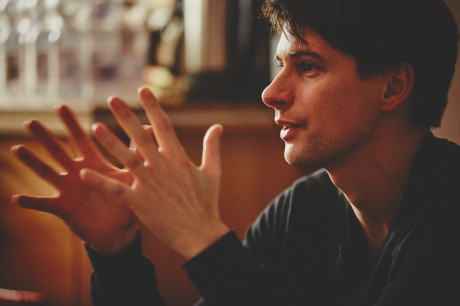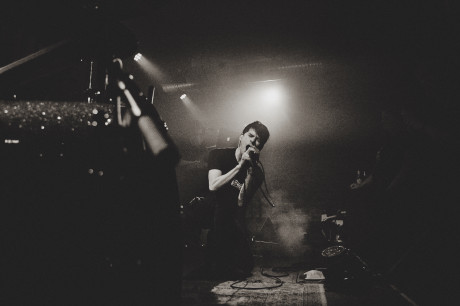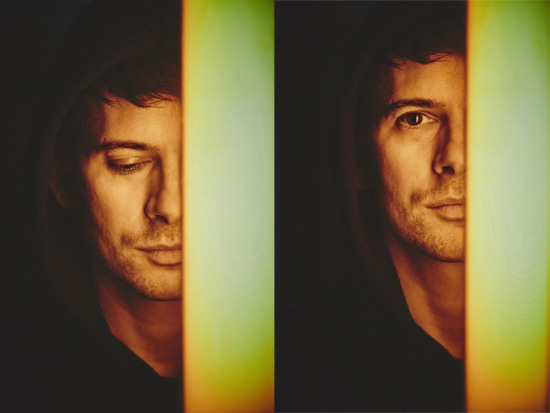
Unexpected success for London pop duo Empathy Test – interview
Posted In Interviews,Slider by Jimi Nilsson
If you’ve been paying attention, you should be as utterly infatuated by London electronic pop duo Empathy Test as I am. Their time-travelling mix of analogue 80:s synthpop and contemporary electropop, with bits and pieces of chillwave and dreampop, refined into 22 tracks on two debut albums, makes Empathy Test 2017 an exciting addition to the electronic pop scene.
Release Music Magazine’s newest recruits Jimi Nilsson and Julia Schwendner (photo) meet up with Empathy Test singer Isaac Howlett before the concert at Nochtwache in Hamburg for a chat about unexpected fame and glory, how it is to end up in a music scene they never aimed for and the reason for releasing two debut albums.
The road to being a DIY band
Welcome back to Germany. Two tours in Germany as a support band in just a few years and now on tour as a headliner with two debut albums. How is it to be the headliner just a few years after you started?
- It was quite scary. Obviously, when you are a support band it’s up to the main band mostly to bring the audience. If it’s quiet they feel like ”oh, bad” but it’s not our problem, and when we discussed it I wondered whether it was too soon but it has been really successful. We sold out two shows including tonight and the other ones have good numbers. Oberhausen was not sold out but felt busy and was a good start of the tour, and last night in Hannover was really amazing.
If you compare with many other bands in the synth scene, in particular in the synthpop genre, most bands are quite old. Just compare with the bands performing at the Amphi Festival this summer and you probably lowered the average age with at least 10-15 years. How come that two young lads from London want to join a music genre slowly fading away?
- I remember that we didn’t put up any photos for quite a long time. We just had the artwork and then we had a press shot taken, put it up and said that it’s time to show our faces and all these people was like ”wow, that was not what I expected”. They were expecting two guys in the forties or fifties with bald heads.
What was the major influences, the inspiration, for you to start?
- The ”Drive” movie made synthesizers popular again. That’s how Empathy Test started, which is how a lot of bands started recently although it’s a bit of a cliche. It was January 2013, and on New Year’s Eve I went out and came home five in the morning. Instead of going to bed I watched ”Drive”. At that timing it just had such a profound impact on me because I was a bit drunk and it was New Year’s Day. I was blown away and then I went to see Adam, and we were talking about the film and the music. And this is literally what happened. He said “we can make a track like that, easy” and I was like “let’s do it” and continued ”which of my songs should we use” and Adam said “we should do that one that you never finished, it has always been my favourite thing you have done”. We sat down at the computer and made ”Losing Touch”. Then we played it to all our friends – we have been making music on and off together and nothing have really clicked or worked – and when they heard it they were like “this is it”.
You are still a DIY band, how did you get to the decision to do it on your own? It’s quite a big step to take in particular considering economy.
- Yes, we have a booking agent but no record label and no management at the moment. I basically manage us. But it’s a lot of work and I also have a fulltime job still. This past year I have been working constantly but it gives us the freedom to do things in our own way even if it’s the wrong way and to keep much more of the money. I don’t really see the point in record labels now unless there is a really big record label and they have an audience ready and can put you in front of them or maybe give you a fast track to success. Record labels are basically banks. They lend you the money to make an album, to do PR etc but as Empathy Test we don’t have any recording costs, we do everything from our homes and then we pay a PR company. If we would have a label they would pay for that and then they would want that money back and then they want however much of our profit on top. If you could do it yourself you should do, that’s what I say. We do some things that confuse people a bit like releasing two albums at once.
Double debut albums
You were quite successful in your crowdfunding campaign, reaching 661% of your target. That’s an amazing result and tells us much about your popularity. What did you expect from the campaign?
- 661% is an amazing number and it told us quite a lot that we didn’t know to be honest. We didn’t know that we had that kind of support. We’d never done a crowdfunder before and we worked with PledgeMusic to decide how much money we should aim for and only asked for 4 000£ which was not anywhere near of what we wanted to do. When we decided to release a final single and two albums at once on separate CD:s, suddenly we doubled the costs of producing the vinyl and everything so, really, we needed 8 000£. We were lucky that it was as successful as it was.
Did you plan for two albums from the start and should the album be viewed as expressing different themes?
- We decided slightly after the campaign went live to release double albums but we did a lot of thinking about it, of what the debut album was going to be and which songs were going to be on there. In our opion we made some really good songs already from the beginning. Our most popular track is still ”Losing Touch” which is the first track we released and during the four years that we have performed as Empathy Test Adam has learned so much about producing music that he didn’t know before. He is a completely self-taught producer and made an album with one of his other music projects called ”Three Laws”. They went into a studio and worked with another producer and he learned stuff there he didn’t know he can do.
We didn’t want those old songs to suffer from never being remixed and remastered with the new skills that Adam had, and it was like if we are going to produce a new album we have to have ”Losing Touch” and it has to have ”Holding on” on there and ”Here Is the Place” and people will get upset if ”Kirrilee” was left out. There were too many songs and in our heads the new material was so much different to be on the same album because too much time had passed. In the end we made the decision to put all our old songs in one album, basically the album we should have released in 2015 but felt like we didn’t hade enough support to do it at that time, and a new album with new songs that sound completely different from the old ones, that’s the reason for two albums. The one thing I regret is calling the album ”Losing Touch” when we already had an EP which just added to the confusion. I should have called it ”Here Is the Place” or anything else. The songs on that album are from 2014 and 2015 and on ”Safe from Harm” they are from 2016 and 2017.
Both albums contain many remastered songs from your EP:s and some songs at ”Safe from Harm” have been released quite recently such as ”Vampire Town”. Why remaster them already? Do you feel that many songs will never be finished?
- We use quite a lot of samples on stage so we had to remix and remaster them anyway for it to be as good quality as the new stuff so if we were going to do that anyway, why not release another CD? Adam would definitely say that some songs are never finished. He is a real perfectionist and I have to be the part that say “come on, let’s finish and release this song”.
You are not afraid that fans would be critical to see old songs re-released on an album?
- We released too many tracks before. Three singles before the album and on each of those singles we put two tracks on there, like an A-side and a B-side, but the problem is that we never meant for them to be B-sides because we don’t write B-sides. We try to make every song as good enough to be singles, in fact it doesn’t leave Adam’s computer until it can be a single. Then, we already had released six songs from the album before it came out but we’ll make it up as we go along.
Speaking of music production and collaboration, do you have common grounds in terms of music taste or is the production process fraught with conflicts ending in some kind of compromise?
- The common ground is that we like epic stuff, we like a good catchy chorus and a good hook so it’s all about making tracks as catchy and memorable as possible. Adam is quite interesting in that he really doesn’t consume music in that way I do or in the way a lot of people, you know ”this is what I like, this is what I listen to”. He just hear stuff every now and then that he really likes. Sometimes someone sends him an album but he isn’t a music listener which is really odd for someone to be as talented as he is. Actually, he said to me as he spend so much time constructing music, when he listens to music he just analyses it. That’s not an overly enjoyable experience. I basically feed him stuff. I find stuff that I like and the best of the best is sent to him with me saying ”you might like this” and all of that goes in and come out on the tracks.
Does it mean that you are taking other musical directions in the future depending on your inspiration and what you feed Adam with?
- We are pushing towards being what we originally wanted to be which is an indie-electronic band – more cutting edge, less nostalgia. Since that first EP, after that it was like ”let’s break up the beats more and being more interesting”. It’s funny because some people criticize us for being formulaic, and I can see that on the first EP that was just a happy experiment. But from the second EP we started to move things forward and I really feel that ”Safe from Harm”, when we put it all together and listened to it through, we were really surprised of the breadth of the sounds and styles. It was in our opinion a much more mature record than the first one but a lot of our fans like the first one better than the second
Does it mean that in the future we may here more acoustic instruments in Empathy Test, such as guitar and bass?
- Definitely guitar! I play guitar and Sam [live musician] as well, probably with heavy effects on there, something with very ambient textures.
Embraced by the ”wrong” music scene
While listening to ”Losing Touch” and ”Safe from Harm” you can hear a change in how you compose music. Has the Empathy Test sound matured during these few years?
- Yes, definitely. A problem that we may have is that ”Losing Touch” was not what we were aiming for in terms of the sound and it came out very dark. Perhaps it is why we have been embraced by the alternative and goth scene which we never saw coming. It is like every track we make after that is like ”is it going to be as big as ‘Losing Touch’”and it never is.
It sounds like you never aimed for the synth and goth scene and festivals such as Amphi and WGT. How do you define your music then?
- No, not at all! We just called our music electronic pop when we started because it’s a broad genre. It’s pop music and it’s electronic. That’s all that we thought about but then people said ”they’re using synths so it’s synthpop” and then people started calling us darkwave or futurepop and we asked ourselves ”what even is darkwave”. But sure it’s great, we don’t really care who likes our music.
It took about six months from releasing our first EP to performing live because we had to work out how we were going to do it but when we had our first show it was crazy. The venue had a something of a 120 person capacity and we sold out. The point is that we discovered that there were people there from Germany, from Sweden and from all over Europe. We had no idea how it happened.
One of the people who were there was Thomas from Wave Gotik Treffen and he was waiting at the bar after I finished playing. I had no idea who he was, I also had no idea what Wave Gotik Treffen was and he said ”I like to book you to my festival” in Germany. I was like ”Oh right, cool” thinking like it was a small festival with a few hundred people. At the time, we were talking to Stars & Letters Records in New York who released our second EP and I told Mark from Stars & Letters about Wave Gotik Treffen and he said ”Holy fuck, he asked you to play at Wave Gotik Treffen? That’s the biggest goth festival in the world” and I responded ”wow, OK cool”.
Then we played at at a club in Dresden for 400–500 people and it was only our second show and we thought ”wow, what’s going on”. Flashforward and we were playing in front of a thousand people at Wave Gotik Treffen, and we were not prepared at all for that.
As you pointed out, synthpop music has a huge fanbase in Germany. How is the response from your Germans fans compared to the UK?
- I don’t think we can do this tour in the UK. We’re going to try, we sold out a show in London but there were a lot of Germans there . It’s really tough, really tough, in the UK to motivate people to go to gigs. If you are the next big thing that everyone are talking about then everyone will come to your show. If not, they are not willing to give people a chance.
Our plan is to go on tour with Covenant in March and we will try to pick up some more fans because with Mesh we just played Bristol, Manchester and Glasgow. We’re going to do some of our own shows as well around that, but compared to Germany, it’s just amazing. People still buy CD:s as well which is really nice.
Finally, what do you expect of the Hamburg fans tonight?
- I hope that tonight’s show will be as fun as last night [in Hannover] which was amazing. It’s a very small venue and I imagine it’s going to be very hot and the audience is going to be right in front of me but that’s how I like it and hopefully they will make a lot of noise, I like noisy crowds.
Photos for Release: Julia Schwendner




